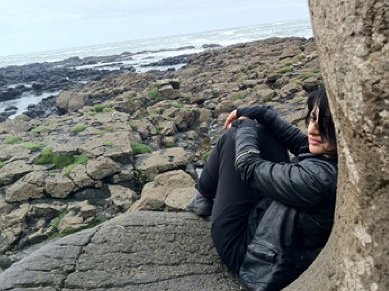As more and more people are producing and releasing music, there has been an exponential growth in promotion agencies. What's your perspective on the promo system? In how far is it influencing your choice of articles and topics, in how far is it useful for pre-selection, in how far do you feel it is possibly undermining journalistic freedom?
I get almost a hundred promo e-mails a day, and these days, most of them are links to streaming music or mp3 downloads, which is too bad. It’s a lot easier to ignore a Soundcloud link than it is to ignore a vinyl record. I’d much rather listen to vinyl or a CD.
How do you see the role of music journalism in the creative process? Should it amplify public taste, distinguish the good from the bad, inform, promote artists, or, as Howard Mandel put it, “illuminate, educate and entertain” readers? Do you feel that, as part of your work, music needs to be explained or should it retain its “inexplicable nature”?
I think that the concept that music is somehow inexplicable in words is lazy. My eyes glaze over anytime someone wheels out the old chestnut about writing about music and dancing about architecture. To those people, I’d say: Go read more. We’ve been writing about the arts since the dawn of civilization. Go read Plato. Read the Vedas.
Music journalism has frequently been attacked for merely expressing opinion. On the other hand, it is precisely personal interest in an artist and/or his work which frequently provides for a stimulus to delve into them in more depth. How would you describe the importance of subjectivity for your writing?
I think that ‘merely expressing opinion’ is a bad choice of words. To be a critic, you must have an opinion – ideally an informed one. I think that music journalism is doing itself a disservice by not being opinionated enough.
Successful fashion magazines are tastemakers, and have no problem with attempting to shape popular opinion. Politics writers have strong opinions. Food writers have opinions. Arts journalism in the United States lost something when it got too scared to have an opinion. Having an opinion is what it means to be alive.
The motto at The Wire, during a particularly inspired period in the early 1990s when my friend Mark Sinker was editor, was 'have fun starting arguments'.
Whom do you feel your obligation to – the artists, the readers, the publication you're writing for? In how much do you feel is music journalism restricted by external factors?
My goal is to always to try to write something new, that hasn’t already been said a million times before. My primary obligation is to my readers.
Journalism and writing have changed considerably over the past century. What, do you feel, could – or should - be new forms and formats for music journalism?
The long essay isn’t going anywhere anytime soon. If you have the ideas and the research to back it up, people notice the painstaking effort that is put in. Readers aren’t idiots. They’re not lemmings.
I think that the obsession with boosting page views has had a poisonous effect on a lot of online journalism outlets.
Brainstorming new business models and formats can be fun, but it’s also a tremendous distraction from the process of writing. I just try to put forth the best writing and thinking that I possibly can. As long as I’m able to support myself, I’ll keep doing it.
Music-sharing sites and -blogs as well as a flood of releases in general are presenting both listeners and artists with challenging questions. What's your view on the value of music today?
I think that people should think about the following question: 'What's the most respectful way to get art from this artist I love?' Is it Spotify? Is it Pandora? Is it downloading their entire album for free on the web? Is it paying for the record in a bricks-and-mortar store? Is it paying to download the album legally? Draw your own conclusions.
Please recommend two magazines or journalists to our readers which you feel deserve their attention.
I love writing for Frieze – a contemporary art magazine that is also one of the best music magazines around. They’ve taken more risks and have published more excellent writing on music in the past several years than almost any magazine I know. I owe my editors there a lot – they really believe in me, and my work.
I’m also very happy writing for Slate – the editors there are wonderful, and they like publishing long-form essays and thinkpieces on music.
Please recommend two artists to our readers which you feel deserve their attention.
In the Bay Area, I’ve most recently been impressed with Date Palms and with the work of the William Winant Percussion Group, which always sounds fresh and new.
Visit Geeta Dayal's website at www.theoriginalsoundtrack.com



